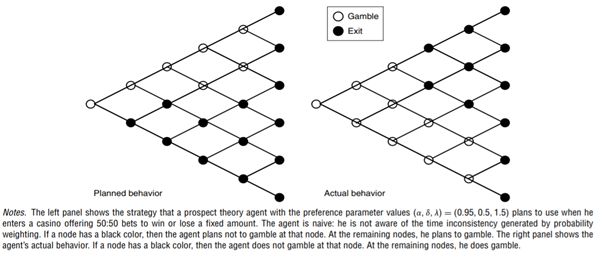"In the casino, the cardinal rule is to keep them playing and to keep them coming back. The longer they play, the more they lose, and in the end, we get it all."
Columella, a prominent writer on Roman agriculture from the 1st century AD, wrote down his complaint about how his devotees would often bet on cockfighting with all their inheritance. His little demur denoted how gambling walked along mankind through its history as it still lives by today, despite being regarded as reprehensible in some ethical sense. The origin of probability itself came from two mathematicians, Pierre de Fermat and Blaise Pascal, solving a gambler's dispute in 1654. There was no doubt that gambling affected civilization, as if it was designed to be appealing to us.
While there's a whole classification of mathematical formulas generated for gambling itself, this essay wants to point out how participants of gambling, as individuals, choose to become a part of it. Neoclassical economics assumes everyone acts rationally and chooses the most optimal decision all the time. Humans, however, as we know, do not constantly act rational; they're prone to errors and are subject to emotional impulsivity. This statement aligns well with one of the most interesting gambling-related questions of all: Why do the majority of gamblers even gamble at all? Even moreso, why do most of them still continue to do so, even though, on average, they lose money? (Stetzka, 2021).
Defining Rationality (and Irrationality)
Dispute runs on the topic of the rationality of gamblers, but what defines rationality and irrationality might be more limited and specific in this context. Rationality in this term is defined as consistent utility-maximizing behavior from a person acting in their best interest. There's also the term "bounded rationality", meaning people with sufficient cognitive ability, information, and time do not always make the "most correct" choice from an economist's perspective. Despite enough information being available to them, individuals with bounded rationality tend to go with their "guts" as they can't process a lot of information in such a short window of time.
Irrational acts, on the other hand, can be defined as inconsistency, being misled by manipulation and deception that suffer from a loss of control of their behavior. Loss of control has been identified as the main driver of problem and pathological gambling (Stetzka, 2021).
In terms of rationality, many arguments have associated gamblers with both ends of the spectrum. For example, there is evidence on gamblers that make money from gambling using sophisticated strategies, or insider information (Stetzka, 2021). These gamblers can be considered rational, almost associated with the same pathway of thinking like those of rational financial investors. Furthermore, the market outcomes in gambling and betting markets suggest that there must be high levels of sophistication and sound economic reasoning behind many gamblers' decisions, like those who use odds as predictors for the outcomes (Ibid.).
On the contrary, a fraction of gamblers had been found to end up in the worst consequences of gambling, such as divorce, job loss, debt, and even imprisonment---most of which are the results of loss of control while gambling. The irrationality of some individuals that stems from overconfidence, loss aversion and self-control (or lack thereof) became the foundational concept of behavioral economics today. Although irrational, this behavior is actually very common and can be explained through some basic concept of behavioural economics.
Prospect Theory: The Reason Behind Gambling Streaks
Let's do some thought process to better understand one of the key theories in understanding behavioral economics. Say you can choose between getting $900 dollars for free or taking a 90% chance of winning $1000 (therefore also a 10% chance to win nothing), what would you choose? Most people would choose $900 to avoid any risk, even though the expected outcome is the same for both options. But if I asked you to choose between losing $900 and taking a 90% chance of losing $1000, which one would you choose? Even though both options have the same expected utility, most people would probably prefer the latter of the two, the risk seeking option, in hope to avoid the small chances of loss. This behavior, otherwise known as "loss aversion", is at the core of prospect theory and how we make decisions pertaining to risk.










